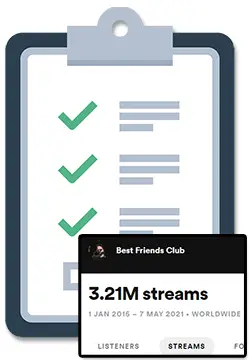In today’s fast-paced digital world, an interesting question emerges for the music industry: Can a record label be digital-only?
Yes, record labels can be digital-only by distributing and releasing music online through streaming platforms like Spotify and through online stores like Bandcamp, Beatport, and iTunes.
With the rise of digital platforms like Bandcamp and streaming services such as Spotify, a digital-only record label has become a feasible option, thriving without selling physical copies of music like older labels.
Let’s explore the pros and cons of starting your own digital-only record label or signing your music to a digital record label.
What Is A Digital-Only Record Label?
A digital-only record label is one that only releases digital music on the Internet. By limiting releases to streaming platforms like Spotify, Tidal, Apple Music, or even SoundCloud and Bandcamp, these labels bypass the need for physical products like vinyl, tapes, or CDs.
- A digital-only label is possible with the advent of streaming services and digital platforms.
- Low startup costs and flexibility are some advantages of this type of label.
- However, potential drawbacks include missing out on high-margin physical products and reduced perceived value.
4 Top Benefits of a Digital-Only Record Label
By releasing your music digitally only, expenses can essentially become zero which lowers the entry barrier and helps you break even without necessarily making a lot of money.
Digital releases also offer flexibility with release dates, allowing you to be much more agile than waiting for physical products to be manufactured.
There can also often be more creative freedom and experimentation to artists, as there’s less financial risk involved.
1. Minimal Expenses
One significant advantage of being a digital-only record label is the potential for minimal expenses.
When starting a record label, it’s essential to manage expenses effectively to balance revenue and costs.
A digital-only label can operate without the need to invest in physical products such as vinyl or CDs, enabling you to break even without generating substantial profits.
By leveraging platforms such as Bandcamp, SoundCloud, and YouTube, you can maintain a digital presence at low to no cost while reaping the benefits of digital distribution.
2. Flexible Release Dates
Another pro of a digital-only record label is the flexibility in release dates.
With physical products, you must wait for manufacturing to be completed to distribute your music. In contrast, digital releases can be made almost instantaneously.
Once an artist finalizes their music, it can be uploaded to digital streaming platforms such as Spotify, Apple Music, and Tidal, often within 72 hours.
This flexibility ensures your music reaches your audience quickly, allowing artists and record labels to take advantage of trends or time their releases more effectively.
3. Reduced Startup Friction
Digital-only record labels significantly reduce the startup friction of launching a record label.
Physical production, such as pressing vinyl or manufacturing CDs, can be time-consuming and requires significant capital investment.
However, choosing a digital-only approach enables aspiring record label owners to get started quickly, without the need for substantial upfront financial investments.
This approach also minimizes the risk associated with producing and storing physical inventory and managing distribution logistics.
4. Increased Creative Freedom for Artists
Finally, a digital-only approach allows for greater creative freedom and experimentation for artists.
Because there are fewer risks and costs associated with digital-only releases, record labels can afford to be more adventurous in terms of the artists they sign and the music they release.
Encouraging artists to explore unconventional genres and side projects becomes more feasible within a digital-only model.
Additionally, digital-only releases can be utilized for unique and niche projects, such as remix albums, acoustic versions, or even brief EPs, giving artists the opportunity to diversify their portfolios without the commitment and expenses of a full physical release.
Disadvantages of a Digital-Only Record Label
On the other hand, some downsides to a digital-only approach include missing out on high-priced and high-margin items like vinyl and having less attention-grabbing social media content.
Additionally, there may be a perceived lower value of digital-only releases compared to physical ones, which could impact how important the release feels to listeners and the artists you’re trying to sign.
1. Missing Out on High-Priced Items
Being a digital-only label means you miss out on high-priced items like deluxe vinyl bundles, test pressings, and limited edition items.
These high-margin products can significantly boost your revenue, whereas digital sales might have lower overall earnings.
With physical products, you can often recoup your investment and generate substantial profits if you’re producing items in larger quantities and selling them at higher prices.
2. Limited Social Media Content
Having only digital releases limits your social media content options.
While you can post album covers and screenshots, this might not grab your audience’s attention as much as showing physical products like vinyl records, tapes, or CDs.
Sharing engaging behind-the-scenes content, such as unboxing videos, can captivate your audience and drive interest in your releases.
Unfortunately, this type of content is much more challenging to create with digital-only releases.
3. Loss of Perceived Value
With digital-only releases, there’s a risk of losing perceived value in the eyes of your audience.
When fans see physical items, they may perceive your releases as more important or professional compared to digital releases.
High-quality physical merchandise or packaging can give your products an added layer of prestige and encourage customers to invest in your label.
4. Limited Offering to Artists
As a digital-only label, you may have less to offer artists you’d like to sign.
Many artists can record at home and distribute their music online themselves, so what makes your label stand out?
Providing physical releases and unique packaging may entice artists to join your label and add value to your roster.
By offering creative, physical products and unique services, you can stand out from the rest and strengthen your relationship with your artists.



